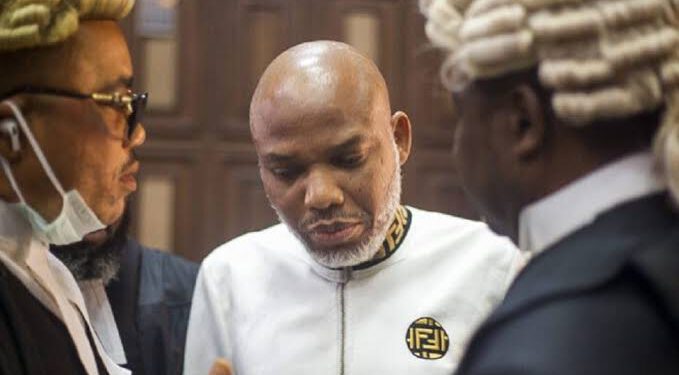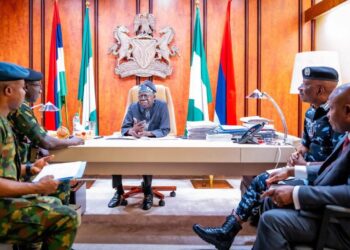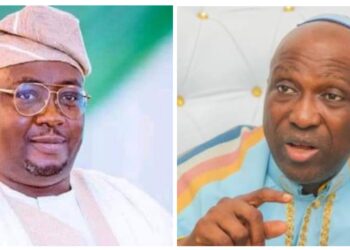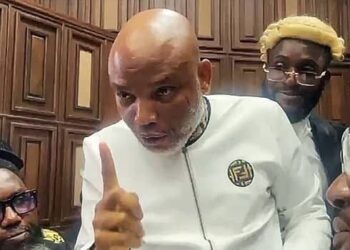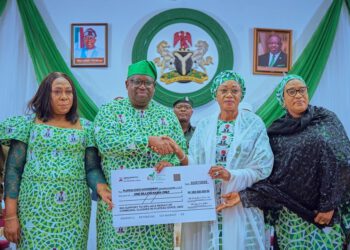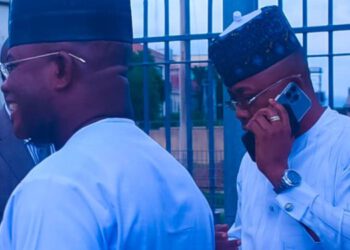The Federal Government on Thursday formally closed its case in the ongoing trial of the leader of the Indigenous People of Biafra (IPOB), Nnamdi Kanu, after presenting five witnesses before the Federal High Court in Abuja.
At the resumed hearing, the prosecution, led by Senior Advocate of Nigeria (SAN), Adegboyega Awomolo, informed the court that it was satisfied with the evidence and exhibits already presented, and would not be calling additional witnesses.
Following this, the defence team, led by another Senior Advocate of Nigeria, Kanu Agabi, announced its intention to file a no-case submission, arguing that the prosecution had failed to establish a prima facie case against the defendant.
Presiding judge, Justice James Omotosho, granted the defence 14 days to file its application and gave the prosecution another 14 days to respond. The matter was thereafter adjourned to Friday, July 18, for the adoption of written addresses on the no-case submission.
DSS Witness Links Kanu to EndSARS Violence
Earlier in the proceedings, the prosecution presented its fifth and final witness, identified only as EEE, a serving officer of the Department of State Services (DSS) based at its headquarters in Abuja.
Led in evidence by Awomolo, the witness disclosed that although he had no personal interaction with Kanu, he became familiar with the IPOB leader through media coverage. He added that in 2021, he led a DSS team to the southern part of the country to gather intelligence relating to the 2020 EndSARS protests.
According to EEE, the team’s mandate included compiling data on the destruction of public assets and securing death certificates of security personnel who lost their lives during the protests.
The prosecution tendered three documents through the witness: a general assessment report on the EndSARS protests, a list of deceased officers, and the corresponding death certificates. These were admitted as Exhibits PWD2, PWD2A, and PWD2B, respectively.
Although lead defence counsel Onyechi Ikpeazu (SAN) reserved his right to challenge the admissibility of the documents at a later stage, he cross-examined the witness on their contents.
According to the documents, the EndSARS protests reportedly led to the deaths of 128 police officers, 37 soldiers, and 10 DSS operatives, with 164 police stations and 19 offices of the Independent National Electoral Commission (INEC) destroyed nationwide.
Defence Challenges Alleged Link to IPOB
During cross-examination, Ikpeazu questioned the credibility of linking Kanu or IPOB to the EndSARS unrest.
“Are you saying categorically that the EndSARS issue is a Biafran issue?” the lawyer asked.
“No,” the witness replied. “My assignment was not to investigate Biafra but the EndSARS protest, to which the defendant incited the public.”
The witness claimed that Kanu’s broadcasts constituted one of the underlying causes of the unrest, describing such communications as subversive and inciting.
Pressed further, the witness conceded that police brutality by the now-defunct Special Anti-Robbery Squad (SARS) may have been a secondary cause, but insisted that the root of the unrest was the influence of “subversive elements,” including the defendant.
When asked whether any official panel of inquiry had indicted Kanu or IPOB for the EndSARS violence, the witness admitted he was unaware of such findings and had not read the Lagos State Judicial Panel report, which had been admitted earlier in the trial as Exhibit PWO.
“I put it to you that there was nothing in that report which indicted the defendant or IPOB for the damages emanating from the EndSARS protest,” Ikpeazu said.
“I have not read the report, so I don’t know,” EEE responded.
Background
Nnamdi Kanu is facing a seven-count charge bordering on terrorism and treasonable felony. He has consistently denied all charges.
The outcome of the no-case submission will determine whether the trial proceeds to the defence stage or if the court agrees that the prosecution has not established a sufficient case for Kanu to answer.


